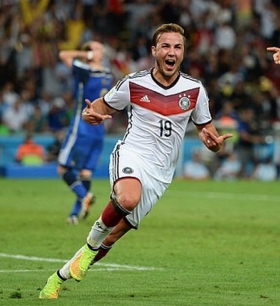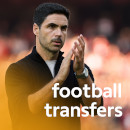Over Bar the Shouting
Over Bar the Shouting

The 2014 World Cup closed its curtains today with a tense final between two giants of international football. Ultimately, a moment of brilliance did decide the game. But it wasn't from who we all expected it to be.
Mario Gotze must be pinching himself, realizing schoolboy dreams by breaking the deadlock midway through extra time to bring the World Cup back to Germany for the first time in 24 years.
Germany has come a long way since the disappointment of crashing out at the Group Stages of Euro 2000, with most of the players on show today in their early teens during that period.
In place of the physical, almost mechanical German team of the early 2000s, we have a sleek, fluid German team that really came into their own in Euro 2008 onwards, with the promotion of Joachim Low.
Interestingly, this coincided with the blossoming of German football at the European stage; Bayern Munich and Borussia Dortmund have made great strides in recent years, and have been instrumental in developing the blueprint for this German side.
Germany had an early setback with Samir Khedira pulling out of the game with an injury; Christoph Kramer stepped in but took a nasty knock which saw him replaced after half an hour in one of the most bizarre, and heartbreaking World Cup debuts ever.
Andre Schurrle provided more energy (if a lack of end product) down the wing with Mesut Ozil tucking in behind Klose with the injury to Kramer.
Argentina did well to stifle the German attack, who looked all too narrow in the first half. They threatened Neuer's goal on occasion, with Gonzalo Higuain exploiting a defensive lapse from Toni Kroos to fire wide of the post.
Lionel Messi, as expected, was given all the respect his prodigious talent was due. He fired wide after being put through by Biglia but had little other involvement, other than the free kick he fired high over the bar deep into injury time in extra time.
He seemed perplexed at receiving the Golden Ball, which must have came as a surprise as he hasn't scored since the group stages ended. With Gonzalo Higuain flattering to deceive, Sergio Aguero off the pace (or failing to dovetail), and Rodrigo Palacio doing little to impress; Argentina was blunt in attack with all their hopes placed on the Balloon d'Or winner.
Miroslav Klose, who must be playing in his last World Cup, was crowded out by the Argentine defense and was not able to stretch the defence due to his lack of pace and sharpness.
Still he can hold his head high having surpassed Ronaldo as the all time leading scorer in the World Cup.
He was supported by other veterans of the German team, though they are hardly old timers in, Bastian Schweinsteiger (29) who put in a combative display in midfield; and Phillipp Lahm (30) who slotted back into his old full back role in recent games.
Hoewedes crashed a header against the post and the Germans looked to threaten on several occasions, but the Argentine defense was resolute; marshalled superbly by Javier Mascherano.
Towards the closing stages, exhaustion threatened to dash German hopes as Mats Hummels in particular struggled to stay in the game. Jerome Boateng and Bastian Schweinsteiger were on hand to help out their defensive lynchpin, who has been tireless for the entire tournament sitting in front of the excellent Manuel Neuer.
Ultimately, Mario Gotze, who faded into the background in favour of Miroslav Klose after appearing in the group stages, decided the game, ghosting in from the left wing to finish off Andre Schurrle's cross with aplomb.
This may be the start of a German dynasty in international football. It was France at the turn of the century, then Spain in recent years. With the relative youth of this German squad, the potential sitting on the bench (or at home) and the cohesion that has been on display, we can look forward to a sustained period of dominance for Germany.


